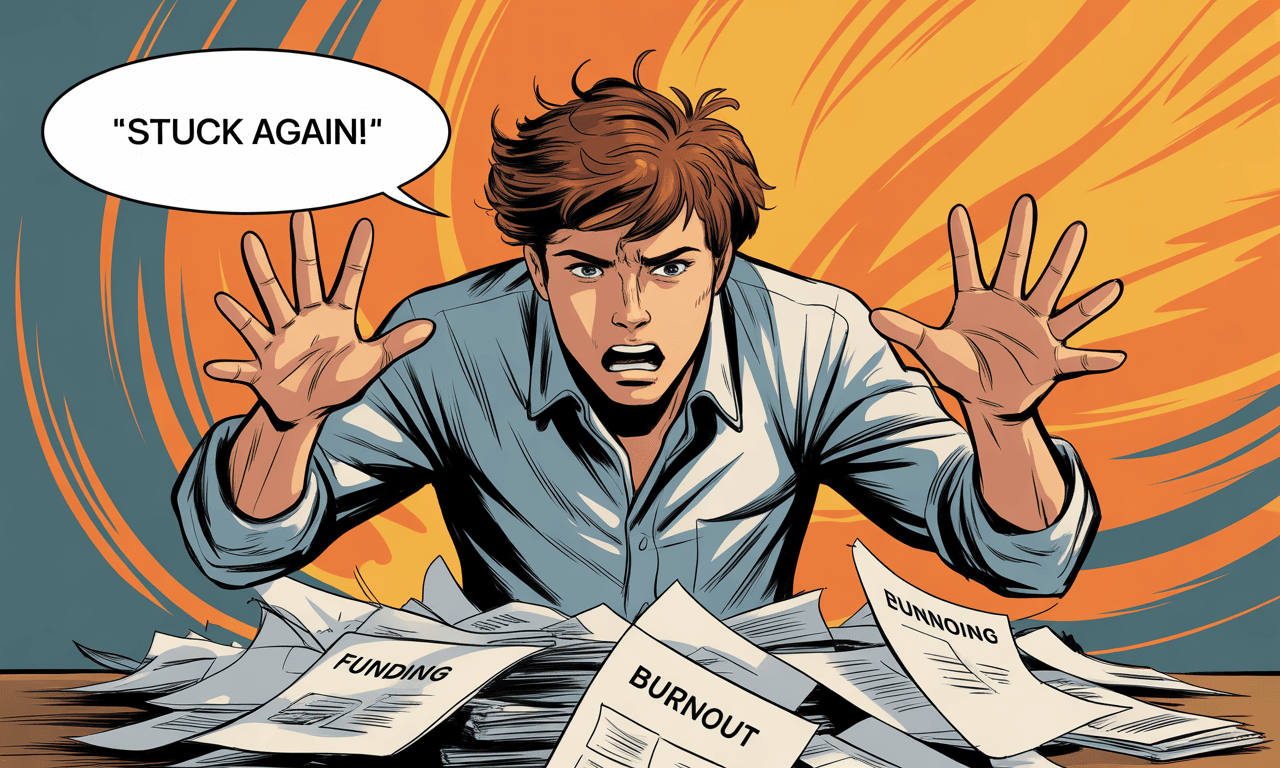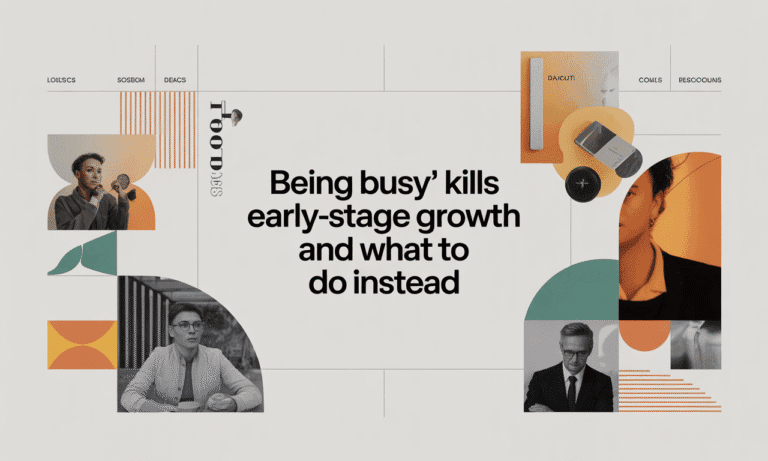If you’re a first?time founder or running a small business, here’s a truth no one tells you often enough:
The greatest risk to any business is that the founder doesn’t want to do it anymore. You just got to want it more than you hate what it takes to get it.
Because running a business is long. It’s messy. The biggest danger isn’t cashflow, competition, or bad luck, it’s that one morning you wake up, look around, and realise you hate what you’re doing. When you stop loving your business, it’s basically dead. If you’re not careful, you might even Hate Your Own Business.
In this post, I’ll show you why this matters more than you think, how other founders burn out when they don’t guard this, and, most importantly, a framework to build your business so you don’t lose your love for it.
Why “not hating your business” is not just soft talk
I’m not asking you to be blindly optimistic or ignore the hard parts. I’m saying: if you don’t enjoy this, you’ll quit or make bad decisions. And that will kill the business. Below are data points that show this is far from “just philosophy.”
Burnout & quitting are real risks
- A Sifted survey reported 54% of founders had experienced burnout in the past 12 months; 46% said their mental health was bad/very bad.
- In the same report, 61% said they had considered leaving their startup.
- Another study (Startup Snapshot) found ~72% of founders report burnout.
These are early or growing?stage businesses, not mature ones. Burnout shows up early, and it hits you first.
Productivity, creativity, and satisfaction drop when you hate parts of your work
- According to psychology research, people who enjoy their jobs make fewer mistakes, learn faster, are more motivated, and produce better quality work. When work feels like drudgery, decision fatigue kicks in.
- Work environments with fun, enjoyment, where people aren’t filled with dread or guilt, show greater innovation, less turnover, and more resilience. (I get why the big 4 offices are so fun!)
Long hours amplify the risk
- Founders are often working 50-70+ hours per week. But productivity per hour drops significantly after ~50 hours. In many startups, founders cross that line, and what they lose in mental stamina shows in how they run the business.
What I mean by “don’t hate your business” in practice
Hating your business doesn’t mean “business sucks sometimes.” It means there are parts you loathe so badly they chip away at your sanity, motivation, or capacity to persist.
I’ve seen it up close in the last 30 days, founders teetering on burnout not because of market crashes or cash shortfalls, but because they’ve let “hate” seep into the business:
- A team member who’s technically solid but drains your energy so badly you dread Monday mornings.
- A product line that prints money but knots your stomach every time you touch it.
- An office or workspace that looks impressive to others but feels suffocating the moment you step in.
- A website or design you can’t stand to look at because it no longer matches your vision.
These aren’t minor annoyances to park on a “someday” list. They’re rot, and if left unchecked, they’ll hollow out your desire to keep going.
A framework: Build Your Business So You Don’t Give Up
Here’s a simple guide, a framework, to help you structure your business so it stays something you want, not something you endure. Use this intentionally.
| Pillar | What to check / questions to ask | Actions you can take now |
|---|---|---|
| Core Passion & Purpose | Why did you start this business? What part of the work energises you? Which parts drain you? | Write down your “why.” Identify 1?2 core functions you love doing; try to do more of those. Delegate or restructure parts you hate. |
| Tasteful Ownership Over “Nice to have” | What are small assets or decisions you dread every time you deal with them (office, team, tools, product features)? | Cut or change them now, fired the soul?drainer, move out of that space, scrap the feature. Don’t sit on them hoping they’ll get better. |
| Sustainability & Burnout Checks | Are you regularly thinking “I can’t keep doing this”? Working absurd hours? Skipping rest or personal life? | Set boundaries: work hours, rest days. Create systems (team, automation) to take load off. Build feedback loops with cofounders/mentors to catch when you’re slipping. |
| Emotional Hygiene | Are you avoiding things because they upset you? Are there recurring frustrations that make you feel powerless? | Talk with someone you trust, mentor, peer, coach. Remove or reduce the triggers. Celebrate small wins. Approve yourself for sticking it out. |
| Permission to Quit or Pivot Early & Cleanly | Do you feel locked in because you invested too much? Do you feel trapped? | Decide what “being over it” looks like. Set criteria for pivot or stop. Make quitting (or changing direction) a strategic option, not a failure. |
Steps you can act on today
Because frameworks are only good if you act. Here’s what to do right now if you feel the fire has dimmed.
- List your “hate items.” Take 15 minutes: list 5 things about your business that you dread doing or dealing with (people, product, features, operations, design, brand, whatever).
- For each, ask: “If I fix this, would I enjoy business more?” If yes, pick the top 1?2 and commit to removing/changing them this month.
- Add a weekly check?in with yourself. “On a scale of 1-10, how much joy did I get this week from my work vs how stressed out?” Track that. If you hit a streak of 3 weeks below, then take corrective action.
- Create “non-business joy buffer”. Schedule something totally unrelated you love — not work, not plans. Book it weekly. This buffer feeds you.
- Hire or let go based on soul weight. Overpay someone who makes your life much easier. Fire someone who drains you, even if “competent.” It costs less in the long run.
My own story (why I believe this so hard)
When I founded Nomad Founder, I thought passion alone would carry me. I wore 80-100 hour weeks, built every feature, handled every hire. Around year 2, I remember waking up and feeling a weight: “Is this business mine, or am I just trapped by what I already built?”
What saved me was the brutal decision to remove certain product features I liked but hated shipping regularly. Also letting go of partnerships that looked good on paper but cost me joy. Those choices didn’t immediately multiply revenue. They did, however, keep me in the game. They kept me caring.
Conclusion: Loving your business isn’t optional, it’s strategic
If you want your business to last past year 3-7, if you want to fight the times when everything feels heavy, you can’t ignore what you feel. The business you build must be one you don’t hate, because hate corrodes resilience, clarity, decisions.
This isn’t “nice?to?have.” It’s a survival tactic. Guard your love for your business like it’s an asset, because it is, maybe your greatest one.
What’s one thing in your business you’re currently tolerating that you hate? What’s stopping you from changing it? I challenge you to take one courageous move this week, fire it, remove it, redesign it, something that lets you breathe a little more. If you share it, I’d love to see what you pick. And if you need help deciding, I’m here.





